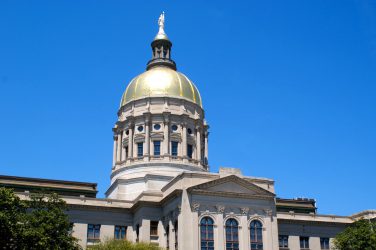For the second time, President Donald Trump has pulled the United States out of the Paris Climate Agreement — a hit to climate change efforts.
The Paris Climate Agreement, adopted in 2015, aims to reduce the risk and impact of climate change by calling for countries to reduce greenhouse gas emissions. During President Trump’s first term he withdrew from the agreement, but former President Joe Biden rejoined, followed by a speech stating that “we can no longer delay or do the bare minimum to address climate change.”
Just one hour after taking office again, President Trump put in motion withdrawal for a second time, arguing that it burdens the American economy.
During President Trump’s speech on Inauguration Day he vowed to “drill, baby, drill” — but what does this mean, and how is the United States response to climate change being discussed?
Differing Opinions
At the University of Georgia, there has been debate among student political organizations about the decision to withdraw.
Chaston Atkins, membership director for College Republicans, felt happy when he heard the news.
“I think the United States is committed in its own way,” Atkins said. “I think that it just needs to begin a fair shake on the deal and not be set to a standard that’s impossible or difficult for us to get everyone in all 50 states on board.”
According to Atkins, having a broad group dictating policy and handing out fines isn’t always constructive. He believes what the country needs is to “roll back some of the red tape.”
Some international group coming in and telling you how to operate your own business isn’t going to be incredibly effective,” Atkins said.
Alternatively, Young Democratic Socialists of America (YDSA) had different thoughts.
Hampton Barrineau, chair of YDSA, felt despair when hearing about the withdrawal.
“We just saw recently — Hurricane Helene, we saw rural communities absolutely flooded out, incredible water and flood damage,” Barrineau said. “I don’t know any part of the country that would not be affected by increased precipitation, higher temperatures, longer drought periods, more ferocious storms. All these things will have an impact on us, no matter where you are.”
The United States is one of the most vulnerable countries to extreme weather according to the Fifth National Climate Assessment. Barrineau felt that pulling out of the agreement, with a country that can stand to benefit from a more stable climate, will ultimately hurt American citizens.
“The cost of climate change is something that cannot be understated,” Barrineau said.
Despite the decision to withdraw, it takes up to 12 months for the pullout to take effect. Because of this, the United States won’t formally withdraw until 2026.
The question remains — what does leaving the agreement mean for the future of climate change activism and what will be the effects?
Climate Change Efforts
According to the Potsdam Institute for Climate Impact Research, the U.S. is second among the world’s largest historical greenhouse gas emitters. The decision to withdraw comes after the hottest year on record, filled with wildfires in Los Angeles and hurricanes devastating parts of the Southeast.
As global warming continues to increase, many experts have been tracking, monitoring and communicating the importance of keeping temperatures below 2°C.
The best way to fight climate change is to not put those gasses into the atmosphere in the first place,” said Pam Knox, director of the UGA Weather Network.
“It’s much more cost prohibitive if you were going to try to take it out once it’s in there, and so the best way to do it is to not use it in the first place,” she said.
Knox said anything that you do to alleviate climate change is going to cost money, but mitigation involves weighing out those costs.
“Even though it might seem kind of worthless, it really makes a difference,” Knox said. “Because if everybody on Earth does something, then that’s going to help cut the worst impacts.”
Guinevere Grant is a junior majoring in journalism and criminal justice at the University of Georgia.








Show Comments (0)